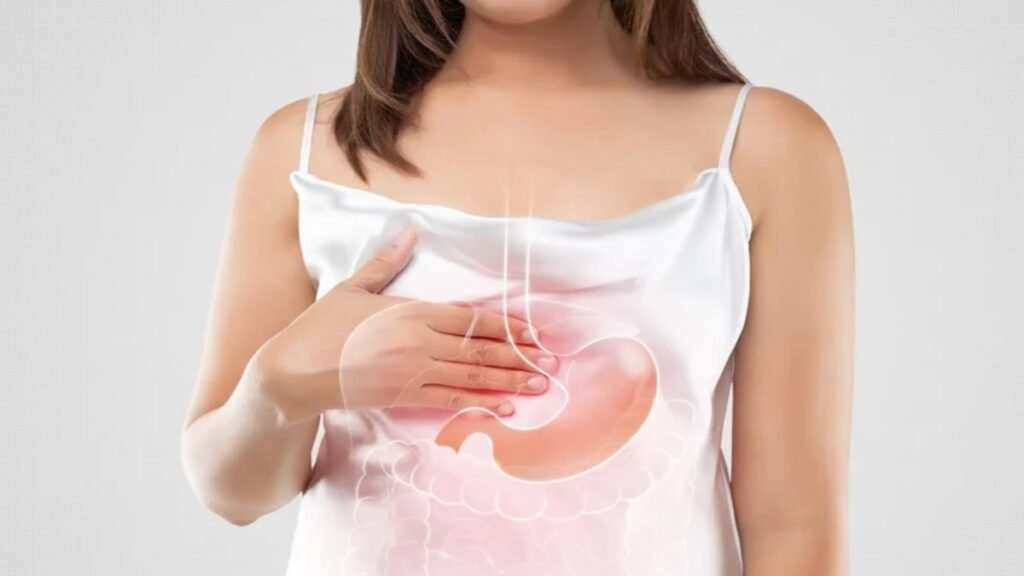Overview
Heartburn—a burning sensation in your chest or throat—affects millions of people regularly.
It’s often caused by acid reflux, which happens when stomach acid moves up into the esophagus, causing discomfort.
Fortunately, heartburn relief doesn’t always have to involve medications. Here are the 10 best ways to relieve heartburn naturally and effectively.
By incorporating these strategies, individuals can reduce their reliance on medication and improve their overall digestive health.
Table of Contents
What is Heartburn?
Heartburn, a common digestive issue, occurs when stomach acid flows back into the esophagus, causing discomfort and a burning sensation.
While medications can help manage symptoms, many people prefer natural remedies. This blog explores 10 ways to relieve heartburn naturally, ranging from dietary changes to lifestyle adjustments.
Top 10 Ways to Relieve Heartburn Naturally Include:
1. Avoid Trigger Foods
Some foods are notorious for triggering heartburn. Spicy foods, chocolate, caffeine, carbonated drinks, tomatoes, citrus fruits, and fatty or fried foods are common culprits. Pay attention to your body and try eliminating or reducing these triggers from your diet.
2. Eat Smaller, More Frequent Meals
Eating large meals can put pressure on the stomach, increasing the likelihood of acid reflux. Opt for smaller, more frequent meals instead. This approach not only reduces heartburn risk but can also help stabilize blood sugar and improve digestion.
3. Avoid Your Alcohol Intake
Alcohol can relax the lower esophageal sphincter (LES), allowing stomach acid to flow back into the esophagus. Cutting down on alcoholic drinks can prevent heartburn and support overall health. Try switching to mocktails to reduce the risk of reflux.
4. Stay Upright After Eating
Lying down immediately after eating can make heartburn worse. Instead, stay upright for at least 2-3 hours after a meal. This allows gravity to help keep food and stomach acid where they belong.
5. Elevate the Head of Your Bed
If you suffer from heartburn at night, try elevating the head of your bed by 6 to 8 inches. This can prevent stomach acid from rising into the esophagus while you sleep. A wedge pillow or bed riser can help achieve this angle comfortably.
6. Chew Gum
Chewing gum, particularly after a meal, stimulates saliva production, which can help neutralize stomach acid and wash it back down into the stomach. Opt for sugar-free gum to protect your teeth while reaping the benefits of saliva production.
7. Wear Loose-Fitting Clothes
Tight clothing, especially around the abdomen, can put extra pressure on the stomach and encourage acid reflux. Loose-fitting clothes can prevent this, making you more comfortable and reducing the chance of heartburn after meals.
8. Drink Ginger Tea
Ginger is known for its digestive and anti-inflammatory properties, which may reduce acid production and calm the stomach. Try sipping on ginger tea after meals to soothe your digestive system. Just avoid excessive amounts, as ginger can be strong on the stomach lining in large doses.
9. Try Natural Antacids
There are a few natural options you can try in place of over-the-counter antacids. A teaspoon of baking soda in a glass of water, for example, can neutralize stomach acid temporarily. Aloe vera juice is another natural remedy that may soothe the lining of the esophagus.
Note: Speak to a healthcare professional before using these, especially if you have other health conditions.
10. Manage Your Stress Levels
Stress can worsen symptoms of acid reflux, making heartburn more frequent or severe. Incorporating relaxation techniques like meditation, deep breathing exercises, and yoga into your daily routine can reduce stress and, consequently, heartburn symptoms.
Final Thoughts
Relieving heartburn naturally is achievable through simple lifestyle and dietary changes.
By adopting these ten methods, such as consuming smaller meals, staying upright after eating, and incorporating specific foods into your diet, you can significantly reduce the frequency and intensity of heartburn episodes.
Emphasizing prevention and self-care not only enhances your comfort but also promotes long-term digestive health. While occasional heartburn is common, chronic symptoms may require medical attention.
These 10 strategies can provide relief and help manage symptoms naturally, but if your heartburn persists, consult a healthcare professional to explore additional treatment options.
FAQs
1. What is heartburn?
Heartburn is a burning sensation in the chest caused by acid reflux, where stomach acid backs up into the esophagus.
2. What are the common triggers of heartburn?
Common triggers include spicy foods, citrus, tomatoes, chocolate, caffeine, alcohol, and large meals.
3. Can stress cause heartburn?
Yes, stress can increase stomach acid production and lead to heartburn symptoms.
4. What lifestyle changes can help relieve heartburn?
Eating smaller meals, avoiding lying down after eating, maintaining a healthy weight, and quitting smoking can help.
5. Are there specific foods that can help alleviate heartburn?
Foods such as ginger, oatmeal, aloe vera, and bananas are known to soothe the stomach and may reduce heartburn.
6. Is it safe to use natural remedies for heartburn?
Most natural remedies are safe for mild heartburn, but it’s always best to consult a healthcare professional, especially if you have ongoing symptoms.
7. How long does heartburn last?
Heartburn can last from a few minutes to several hours, depending on the individual and the triggers involved.
8. When should I seek medical attention for heartburn?
If you experience severe or persistent heartburn, or if it’s accompanied by symptoms like difficulty swallowing or chest pain, seek medical attention.
9. Can drinking water help with heartburn?
Drinking water may help dilute stomach acid and wash it down, providing temporary relief for some individuals.
10. Are there exercises that can help with heartburn?
Gentle exercises like walking can aid digestion, but high-impact or intense workouts right after eating may worsen symptoms.

